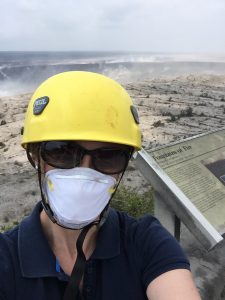August 23, 2018
Women’s Equality Week Q&A with Kristin Ludwig
Posted by Timia Crisp
For the entire week, we are celebrating prominent female figures in science and science policy to recognize Women’s Equality Day on 26 August.
Today, we are excited to focus on Dr. Kristin Ludwig. Dr. Ludwig is a Staff Scientist in the Natural Hazards Mission Area for the U.S. Geological Survey. Ludwig received her B.S. in Earth Systems from Stanford University and her Ph.D. in Oceanography from the University of Washington.
Who or what has inspired you to pursue your research? Supporting response to the Deepwater Horizon Oil Spill in 2010 inspired me to pursue my work in hazards. The urgency to stop the spill combined with the difficulty of working in deep water required collaboration across many fields and sectors including oceanography, engineering, industry, academia, and policy. It was challenging and led to many lessons learned for disaster response.
What is an obstacle you have had to overcome to get to your current position? One of the obstacles I had to overcome was pivoting to science policy. I had previously worked in academia then science education and communications. I was fortunate to become an AAAS Science & Technology Policy Fellow, which helped me to quickly acquire new skills and build my professional network in D.C. Participating in the fellowship program opened my eyes to the incredible opportunities that are available to apply one’s technical expertise and problem-solving skills to a wide variety of issues.
Did you have any important mentors in your career, and how did they impact you? I’ve been fortunate to have several influential mentors. Very early in my career (age 12!), I had the opportunity to meet Dr. Robert Ballard, who is a marine geologist and recognized discoverer of the Titanic. At age 16, I joined Ballard and his team at sea for my first research expedition as a JASON Project “Student Argonaut.” We studied deep sea hydrothermal vents in the Sea of Cortez, and I was determined to pursue a career in oceanography. Ballard provided me with the chance to get in the field at an early age and gave me key advice and connections to help me explore the ocean sciences.
More recently, many of my mentors have been colleagues. By working together, I learn new ways of approaching problem solving, strategic thinking, and maintaining a sense of humor. All of this said, one of the things I’ve struggled with is finding female mentors in my field (including science and science policy), and I hope that this changes for future women in science and science policy. To support this change, I have enjoyed mentoring early career female scientists through a variety of mentoring programs.
What discovery do you hope is made in your lifetime? There are so many discoveries awaiting us, in areas ranging from public health to environmental science. I hope that we discover a way to create better policies and investments to mitigate the costly impacts of disasters. We have the science. We have the creativity. However, communities are often limited by resources and competing priorities. I hope that this can be overcome to reduce the loss of life and property in the future.
Do you have a favorite photograph from your career? If so, would you share it with us and tell us why it is important to you? [The photo above] is from June 2018 when I had the chance to support response to the 2018 Kĩlauea eruption. My group, the Department of the Interior Strategic Sciences Group (SSG), was called on to assemble a multidisciplinary team of experts to assess the cascading consequences of the eruption and to provide insights into possible actions that could be taken to mitigate some of the impacts of the eruption. We were so fortunate to have a talented, enthusiastic, and creative group come together on very short notice in Hilo in July 2018. The team included individuals with expertise in volcanology, geochemistry, public health, urban planning, anthropology, risk communication, economics, and Hawaiian culture. Our work presented a unique opportunity to create direct connections between subject matter experts and decision makers in the affected area. As I write this, we are continuing to deliver briefings and reports to stakeholders.


